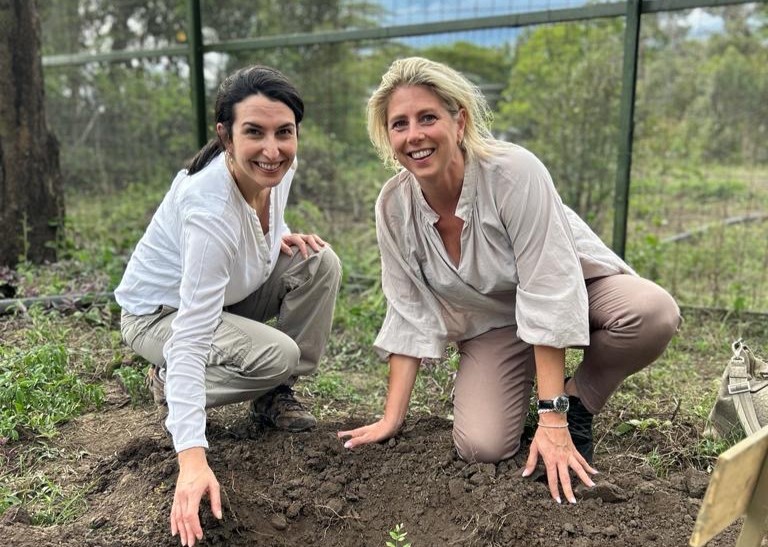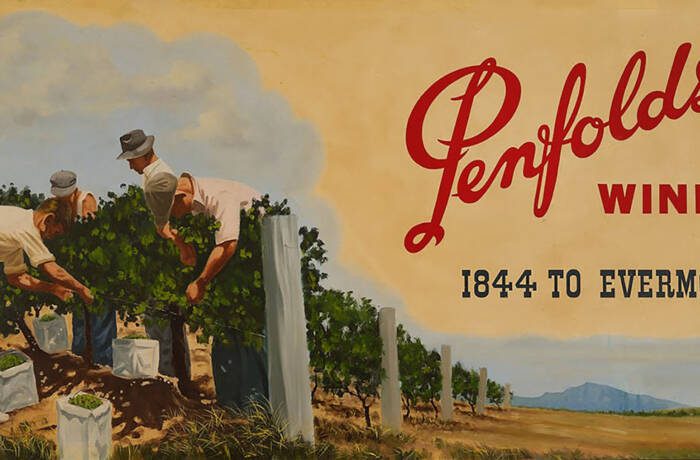
Nina Hoas of LGT (right) and Silvia Bastante de Unverhau (left) of LGT Philanthropy Advisory in Kenya, tree planting
Global annual philanthropy giving today is estimated at over $1tr. The world will see the largest intergenerational transfer of wealth in history by 2045, some $84tr being passed down in US alone. Next gen inheritors are finding purpose in their wealth, responding to urgent causes, and driving change ‘in my lifetime’. LUX Leaders & Philanthropists Editor Samantha Welsh speaks with Head of LGT Philanthropy Advisory, Nina Hoas, on strategies for enhancing impact through collaboration, leadership, innovation and doing good, well.
LUX: What made you decide on a career centred on addressing inequalities and social justice?
NINA HOAS: I am Swedish, but when I was growing up my family moved and travelled around a lot, from Latin America to Asia, and I had the opportunity to live in places like Bangkok in Thailand where my family was for seven years. So I grew up in a family that was not afraid of being in different communities or sharing their experiences and being with different cultures. Every year from when I was one year old we would go to Kenya to stay with my godparents who lived in Nairobi and had a holiday home outside Mombasa. We would go to the Swedish school for a few weeks where my aunt was a teacher, and visit the nature conservation areas. Those experiences in Kenya really shaped my awareness of the socio-economic contrasts to my own home in Sweden as well as of course nature and biodiversity.

Preserving and replanting mangroves, which store carbon, preserve coastlines and act as biodiversity incubators, is important to many next generation philanthropists
LUX: What did that perspective teach you about privilege and shape your ambition?
NH: That holiday home outside of Mombasa was a different world to Sweden, with the housekeepers Kasongo and Yomo living a long bike ride away, in a mud hut, in a tiny village with no running water or electricity. Every year our family would visit and see their kids growing up. Back in the day we only thought in terms of charitable giving, not the empowerment approach we promote today. Donating clothes and food to their extended family was my first real experience of doing good. Schooling and education was not taken for granted for these children either, and all those experiences formed my career path. My godparents lived in Nairobi and were part of the United Nations (UN) community there, so I knew quite a bit about the UN and decided that was what I wanted to do. I therefore studied political science, and received a scholarship by SIDA, Sweden’s development agency, to make a MinorField Study in a refugee camp in West Africa for my Master’s degree. But already before University, I had interned in Kenya with an NGO and UNICEF which coupled with my studies set me on the path to a UN career.
LUX: What for you is ‘doing good, well’?
NS: Strategic philanthropy advisory at LGT is about encouraging more and better philanthropy. We share our network of experts and change-makers, provide platforms where philanthropists can come together, connect and learn from each other with the aim to help them embark on the philanthropy journey in a more strategic way. Strategic philanthropy is about the long term impact your wealth can have.
LUX: What is the approach to wealth in strategic philanthropy?
NH: The relationship managers in our office, together with family advisors, have conversations with clients around the elements of wealth as the starting point. How their wealth was created, how it is invested, how it is spent, how it is given and how wealth is governed and passed on. Every time there is a financial transaction there is an opportunity to have a positive impact. It is about how family values are passed on with the wealth and how these values are reflected in the philanthropic activities.

Rainforests are a carbon sink and produce life-giving oxygen; they are also essential for the maintenance of the earth’s biodiversity, which is inextricably linked to the planet’s habitability and sustainability as outlined by the United Nations Sustainable Development Goals (SDGs)
Follow LUX on instagram @luxthemagazine
LUX: Has your network been affected by the women social investment entrepreneurs’ (SIE) phenomenal growth globally, also why are they so successful in scaling?
NH: We usually talk about seven trends and right now next generation funders and specifically women funders is a significant one within those. Looking at our philanthropy network, we have a lot of women philanthropists we are working with and we noticed that for them it is not only about giving. They are keen to have a strategic approach to their philanthropy and ensure impact. Women drive a lot of the development and community. As a woman, I hence see it as not only the right thing to do, but also economically efficient to focus on the women in communities.
LUX: How far is technology influencing next gen investing strategies?
NH: Technology is very important, especially in scaling various invtiatives, which our Guide to Strategic Philanthropy we co-wrote with Pi covers this in one chapter. Though we increasingly see foundations start asking for technology and even AI and they want it because they understand they can grow and deliver faster services. On the approaches towards social good, the giving is one part, but it does not matter what the methodologies are that you are using, whether through impact bonds, mezzanine funding or partly impact investing or pure giving, whichever, you have a social goal and there are many approaches. We notice some entrepreneurs are very successful in using technology and are very often the ones that also want to adopt or adapt their skills and their experience to do good and they’re using that space.
LUX: Has ‘giving while living’ and philanthropy within a limited time frame created volatility and been disruptive?
NH: With next generation wealth holders in particular, they may have created a structure but want to show they are putting a time frame on it to clarify to donors, to family members and peers that if, for example, it is an endowment then they would spend down within 20 to 30 years. They are still relatively young, in the middle of their careers, and embarking on their philanthropic journey, and they want to act right now on the urgent issues, well before those issues worsen. They also feel strongly and passionately that they want to enjoy doing it in their lifetime and not leave the responsibility to another after their death.
Read more: Terre Blanche: The luxury resort pioneering sustainability

Recent research shows that forests are not just collections of distinct flora and fauna; they vast interlinked collective ecosystems which communicate with each other, and underpin sustainable development
LUX: What does inherited wealth mean to next gen U/HNWIs?
NH: LGT’s newest study is about wealth and about what wealth can do. We are asking only next generation wealth holders, the inheritors not the wealth creators (though some are both). Wealth needs to come with purpose. It is very hard for some of them inheriting and by being rich they do not want to feel poor. They want to separate themselves from their net worth and to have self worth. They want to use their wealth in a catalytic way to do good. They bring purpose to their own life if they can use their wealth through investment for a purpose to empower others. For example, one of our women philanthropists is working in communities in a few developing countries to empower women. In one community, she is reaching around 10,000 women and while they know the funds are coming from a specific foundation, they do not know that the founder is out there in person in the field alongside them as technical support; she remains anonymous to avoid the donor dynamic as she wants to be out there, able to hear if something is not right. She is caring for there to be a good systemic change on the ground and is concerned she will not get truthful feedback because the community will fear the funds will dry up if the project is not going right. She really wants to know what is going wrong so she can learn from mistakes, improve it and change it.
LUX: How does peer-to-peer collaboration help your clients?
NH: This is where strategic advisory comes in as well the connection to other philanthropic leaders. Our clients want to meet others who are focused on similar issues because they want to maximise impact and to collaborate to achieve that. Philanthropists can feel isolated so our purpose is also to connect philanthropists with one another, introduce them to others working in the same area, in order to learn and potentially to partner and to add value. This works well for example in the area of biodiversity and nature. We advise around 50 individuals that are focusing specifically on scaling conservation and nature-based solutions. In this context we took a group to the Massai Mara, which is one of the key initiatives of LGT Venture Philanthropy – the independent charitable foundation established by LGT Group Foundation and founded in line with the vision and values of the Liechtenstein Princely Family. The Princely Family’s long-term vision and commitment to sustainability are deeply rooted in LGT’s corporate culture, and they are very happy to collaborate with others also in philanthropy and impact investments.








